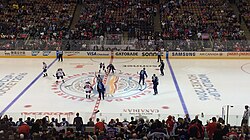 Logo of 2016 event | |
| Sport | Ice hockey |
|---|---|
| Founded | 1992 |
| First season | 1996 |
| Organising body | National Hockey League |
| No. of teams | 8 |
| Most recent champion | (2016) |
The World Cup of Hockey is an international ice hockey tournament. Inaugurated in 1996, it is the successor to the Canada Cup, which was held every three to five years from 1976 to 1991 and was the first international hockey championship to allow nations to field their top players. [1] The World Cup has occurred thrice before on an irregular basis, with the United States winning in 1996 and Canada winning in 2004 and 2016. Following the 2016 tournament, it was uncertain whether the series would be continued, after the cancellation of the 2020 tournament. It is tentatively scheduled to be held every four years, starting in 2028. [2]
Contents
- History
- Canada Cup
- World Cup of Hockey
- Trophy
- Tournaments
- Titles
- See also
- References
- Further reading
The World Cup of Hockey is organized by the National Hockey League (NHL) and the National Hockey League Players' Association (NHLPA), unlike the annual Ice Hockey World Championships and quadrennial Olympic tournament, both run by the International Ice Hockey Federation (IIHF). World Cup games are played under NHL rules and not those of the IIHF, and the tournament occurs prior to the NHL pre-season, allowing all the NHL's players to be available, unlike the World Championships, which overlaps with the NHL's Stanley Cup playoffs.

